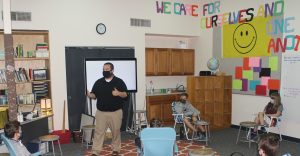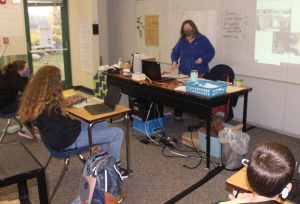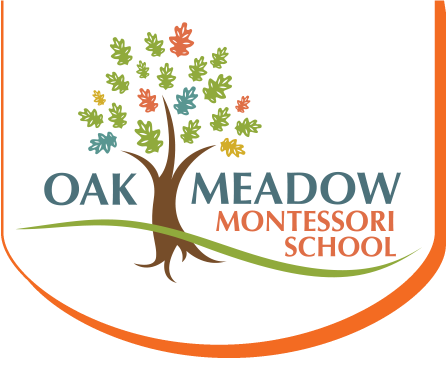During a time of unprecedented engagement in national and state elections, I’ve been impressed to see the students at Oak Meadow thinking deeply about the role of our government and the responsibilities we all have as citizens. Students are learning about history through the perspectives of the diverse peoples and communities that represent our country. They’re learning to understand the ideals stated in our Constitution, and grappling with the complex challenges involved in advancing those ideals through our laws and policy-making. Students are connecting what they learn in the curriculum with what’s actually happening in the world around them today. Our nation’s schools, more than any other single institution, provide the essential foundation for educating our young people with the knowledge, tools, experiences, and skills necessary to become responsible citizens in a democratic society.
 For 6th year students in the Upper Elementary program, students are talking about the Revolutionary War, the American Colonies, Colonial Government, and the US Constitution. Teaching assistant Ethan Dauphinais (now completing a Master’s Degree in American History and Government) is helping students to make connections between the curriculum and world events. Mr. Dauphinais invites the students to come to class prepared to share something about current events. “The goal,” Mr. Dauphinais explains, “is a conversation that is not political but substantive.” How do we elect a President? Why does the electoral college exist? How do we ensure a peaceful transfer of power? In addition to digging deeply into content areas like this, it is just as important that the students develop the social and emotional skills that are important to creating a healthy and productive society. Last week the students brought up one of the recent presidential debates and talked about how the candidates were interrupting each other. That led to a conversation among the students about how we should behave with each other at school when we disagree. Why is it important in life not to interrupt each other? Why is it important to understand different viewpoints and respect individuals who may disagree with us? How can we be respectful in a civilized society? Learning to be a responsible citizen includes our behavior as much as our knowledge.
For 6th year students in the Upper Elementary program, students are talking about the Revolutionary War, the American Colonies, Colonial Government, and the US Constitution. Teaching assistant Ethan Dauphinais (now completing a Master’s Degree in American History and Government) is helping students to make connections between the curriculum and world events. Mr. Dauphinais invites the students to come to class prepared to share something about current events. “The goal,” Mr. Dauphinais explains, “is a conversation that is not political but substantive.” How do we elect a President? Why does the electoral college exist? How do we ensure a peaceful transfer of power? In addition to digging deeply into content areas like this, it is just as important that the students develop the social and emotional skills that are important to creating a healthy and productive society. Last week the students brought up one of the recent presidential debates and talked about how the candidates were interrupting each other. That led to a conversation among the students about how we should behave with each other at school when we disagree. Why is it important in life not to interrupt each other? Why is it important to understand different viewpoints and respect individuals who may disagree with us? How can we be respectful in a civilized society? Learning to be a responsible citizen includes our behavior as much as our knowledge.
 Students in Middle School are taking advantage of the national elections to delve deeply into the substantive issues of the day. “The goal of this class,” says middle school teacher Lori Fox, “is to help the students know how to research the issues on their own so they will learn how to become well-informed citizens. This is essential in becoming a well-informed voter.” The students are using a special edition of Scholastic Magazine (Election 2020) as a framework to identify some of the key issues that are relevant during the current election. Students are given the choice to select a topic that interests them most. Then students are expected to do their own substantive research. Mrs. Fox tells the students that she has given them a few sources to get started, but she expects students to seek out their own sources as well, with a focus on finding sources that are as objective and neutral as possible. Students have a template to record the source of their information as well as the key facts they have discovered from each source. “Biases are embedded,” explains Mrs. Fox, “so it is important to look for sources that are as objective and neutral as possible.” This current unit on the election will naturally connect to the next unit of study — doing research on global issues that are part of the Montessori Model UN experience this spring.
Students in Middle School are taking advantage of the national elections to delve deeply into the substantive issues of the day. “The goal of this class,” says middle school teacher Lori Fox, “is to help the students know how to research the issues on their own so they will learn how to become well-informed citizens. This is essential in becoming a well-informed voter.” The students are using a special edition of Scholastic Magazine (Election 2020) as a framework to identify some of the key issues that are relevant during the current election. Students are given the choice to select a topic that interests them most. Then students are expected to do their own substantive research. Mrs. Fox tells the students that she has given them a few sources to get started, but she expects students to seek out their own sources as well, with a focus on finding sources that are as objective and neutral as possible. Students have a template to record the source of their information as well as the key facts they have discovered from each source. “Biases are embedded,” explains Mrs. Fox, “so it is important to look for sources that are as objective and neutral as possible.” This current unit on the election will naturally connect to the next unit of study — doing research on global issues that are part of the Montessori Model UN experience this spring.
Here is a list of subjects from Scholastic being used for the project on election 2020:
- Pandemic Response (containing the Coronavirus, preventing future pandemics)
- Racial Justice (bias in criminal justice, addressing economic Injustice)
- Economy (rebuilding the economy, economic inequality, taxes)
- Health Care (state of US health insurance, ideas to improve health insurance)
- Climate change (reducing emissions, energy production in the US, Green New Deal)
- Education (high college costs, segregated schools, teacher pay)
- Immigration (restricting legal immigration, undocumented immigrants, refugees and asylum seekers)
- America & the World (cyberoperations, nuclear threats, international alliances)
There are compelling reasons for providing our students with this kind of civics education: it’s based on our mission; directly connects to our list of 21st century skills; and is built into the North Star values that differentiate an Oak Meadow education.





